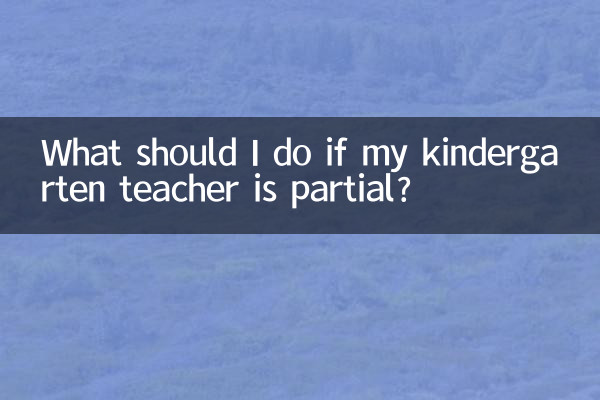What should I do if my kindergarten teacher is partial?
Recently, the topic of kindergarten teachers’ favoritism has sparked widespread discussion on social media. Many parents report that their children are treated unfairly in kindergarten, which makes them feel anxious and helpless. This article will combine the hot topics and hot content on the Internet in the past 10 days to analyze the reasons, performance and coping strategies of kindergarten teachers' partiality, and provide structured data for reference.
1. Common manifestations of partiality among kindergarten teachers

According to parent feedback and expert analysis, kindergarten teachers’ partiality usually manifests itself in the following situations:
| Performance type | specific behavior | Parent feedback frequency |
|---|---|---|
| uneven attention | Pay special attention to certain children and ignore others | 65% |
| Unfair rewards and punishments | Be tolerant to the children you like, but strict to other children | 50% |
| Uneven distribution of activity opportunities | Prioritize certain children in performances or activities | 45% |
| Differences in emotional expression | More affectionate with some children, more distant with others | 40% |
2. Analysis of the reasons for kindergarten teachers’ partiality
There are various reasons for teachers' partiality, including both subjective and objective factors. Here are the main reasons mentioned in discussions across the web:
| Reason type | Detailed description | Proportion |
|---|---|---|
| Differences in children’s personalities | Lively and cheerful children are more likely to be favored by teachers | 30% |
| Frequency of parent interaction | Parents who communicate frequently with teachers get more attention from their children | 25% |
| Teacher's personal preference | Teachers have a natural affinity for children with certain characteristics | 20% |
| Class management stress | Teachers tend to focus on “problem kids” or “good kids” | 15% |
| other factors | Such as appearance, family background, etc. | 10% |
3. How parents should deal with kindergarten teachers’ partiality
Faced with the problem of teacher favoritism, parents can adopt the following strategies:
1.Observe calmly and collect evidence: First confirm whether there is any biased behavior to avoid conflicts caused by misunderstandings.
2.Communicate actively with teachers: Express concerns in a friendly manner, understand the teacher’s perspective, and work together to find solutions.
3.Develop children’s independence: Help children build self-confidence and reduce dependence on teacher attention.
4.Talk to other parents: Understand whether there are many parents who have encountered similar problems, and if necessary, they can jointly report to the kindergarten.
5.Seek garden intervention: If the problem is serious and communication is ineffective, a formal complaint can be made to the kindergarten management.
4. Expert advice and preventive measures
Education experts suggest that kindergartens and parents should work together to prevent teacher bias:
| Measure direction | specific suggestions |
|---|---|
| Kindergarten management | Strengthen teacher ethics training and establish a fair evaluation mechanism |
| Teacher self-reflection | Review your own behavior regularly to avoid unconscious bias |
| Parental cooperation | Actively participate in kindergarten activities and establish a good home-school relationship |
| children education | Teach children to correctly view differences in teacher attention |
5. Recent relevant hot events
In the past 10 days, the following topics related to kindergarten teachers’ favoritism have triggered heated discussions:
| event | platform | Discussion popularity |
|---|---|---|
| Parents posted a video accusing the teacher of only praising a few children | Douyin | 500,000+ likes |
| Education experts talk about the phenomenon of "kindergarten partiality" | 100,000+ retweets | |
| Kindergarten launches “Fair Education” training | WeChat public account | 50,000+ reads |
Conclusion
Kindergarten teacher favoritism is a complex problem that requires the joint attention and resolution of parents, teachers and kindergartens. Through rational communication, mutual understanding and system construction, we can create a fairer and healthier growth environment for children. When parents encounter such problems, they must not only protect their children's rights and interests, but also maintain a calm and objective attitude and seek the best solution.

check the details

check the details